- Home
- Brian Falkner
The Real Thing Page 10
The Real Thing Read online
Page 10
Life was looking good at the moment, Dennis thought. The only thing that had dampened his mood just a little was the fact that his direct flight to Auckland had been cancelled due to bad weather and he had been rescheduled on an alternative flight, with a four-hour stopover in Sydney.
THE LOST RECIPE
Anastasia Borkin bustled into the meeting late, leaving the featureless security guard to close the door behind her.
That, in itself, was cause for some consternation among the other Vice-Presidents, as Borkin had never been late for a meeting before, or, in fact, for anything else in her life.
The lateness was deliberate, however, and she allowed herself the tiniest of smiles as she settled in her plush, leather, executive-quality boardroom chair. She had waited in a cubicle in the ladies toilets until five minutes after the meeting had started. The unexpected lateness, she knew, would add credibility to what she was going to say, and credibility was going to be paramount. If the targets of her charade believed her, she would have them hooked. If they suspected she was lying, they’d shut down everything, and she might never find out who they were.
Worse, if they panicked, then their accomplices, who were holding the three missing executives, might also panic, and clean up all loose ends. Which would include Clara Fogsworth, Bingham Statham, and Ralph Winkler. Assuming, that was, they were still alive in the first place. They had to be alive, she reassured herself. Anything else was unthinkable!
So, it was a risk she was taking, but a calculated one.
Keelan had stopped talking when she walked in. He had been in the middle of a sentence but paused, waiting for her to sit.
She didn’t let him finish.
‘We have the recipe, the original recipe!’ she exclaimed, her eyes rapidly scanning the reactions of those around the table. Surprise, uncertainty, hope. All understandable. No obvious shock, or panic. If the spy was at this table, as she believed, then he or she was a very good actor.
‘How?’ ‘Where?’ ‘Who?’ The questions came from all directions.
‘A copy was kept, illegally of course, during the New Coke episode of the eighties, by an employee who thought that it would become a collector’s item one day, never dreaming that we would switch back to the old recipe within a few months.’ It sounded so plausible that Borkin almost believed it herself. She continued. ‘I have guaranteed him immunity from any legal action, and he has agreed to send the recipe by immediate FedEx. It should be here this afternoon.’
That caused a commotion and it was a few minutes before she was able to answer Ricardo’s first question.
‘Why FedEx it? Why not fax it through?’
Borkin had thought of that. ‘It’s scribbled on the side of a cardboard box, an old Coke carton. It can’t be faxed. Maybe he could have transcribed it, but I was afraid he could make an error, so I asked him to send the original.’
‘Are you sure it’s the correct recipe?’ Keelan asked.
Actually she knew it was not. It was 733-23-A with a few changes in case anyone recognised it. She had copied it on to the box herself, then spent an hour rubbing the box on the carpet, standing on it, doing all she could to age it, before posting it to an old school friend in Ontario.
‘Yes, I’m sure. The employee is adamant about it.’
‘Who is it?’
‘I can’t reveal that. It’s part of the agreement.’
Reginald said, ‘I can’t believe you entrusted this to FedEx! Do you have any idea how important this is? Why not send one of our people?’
‘It’s coming from Waterloo, Ontario,’ Borkin said. ‘We don’t have anyone there. FedEx will be fast and safe, and in any case, it’s already on its way.’
Still no panic or guilty reactions from anyone. Was she right? Why was she so sure it was one of the Vice-Presidents? At least ten other people in the company, technicians mainly, must have known the results of the taste tests.
Reginald nodded. ‘All right. Let me know when it arrives. I want our top people to review it immediately and give an opinion on its authenticity.
‘Absolutely,’ Borkin said.
The airport terminal was bigger than they expected. Sydney seemed on a different scale altogether to LAX, which they had flown into and out of, on their way to Atlanta. Tupai said it was because LAX was made up of several smaller terminals, whereas Sydney was just a single big building.
Fizzer had no idea whether Tupai was telling the truth or talking through a hole in his head. But it seemed plausible. Surely LA would have a bigger International Airport than Sydney?
Sharron had said goodbye and, in her most professional manner, had offered to shake Tupai’s hand as they had disembarked. He’d taken her hand, but then, on impulse, those big arms had reached out and hugged her. Fizzer did the same, and he thought he’d seen a tear in her eye as they’d walked up the airbridge.
They were the first ones out and through Passport Control in record time. That turned out to be good luck in more ways than one because if they’d arrived at Baggage Claim just five minutes later they would never have run into Dennis.
‘Fizzer! Tupai!’ he called from across the other side of the luggage conveyor, startling an elderly Japanese couple.
‘Sensei!’
That drew an intrigued look from the couple.
After some vigorous hand shaking, Dennis asked, ‘Something’s wrong. Are you two in trouble?’
Fizzer looked at Tupai, who nodded, before launching into an explanation of the disaster that had occurred and the clue they’d found on board the plane.
Dennis was a good head taller than Fizzer and another half taller than Tupai. He looked down at them and said, ‘What can I do to help?’
The boys didn’t take much persuading, and neither did the airline, which happily delayed his return flight to New Zealand.
Harry Truman made some carefully worded phone calls to a couple of people he felt he could trust beyond question. First he’d had to kick his sons off the Internet, where they’d been in a heavy-metal chat room, so that he could use the telephone.
Then he logged on to the Internet himself, and transferred a substantial amount of money to a friend of his in Sydney. He transferred it from his own personal account, as he had no access to company accounts and, anyway, would need two signatures on a form, which could not happen until the next business day, and which might raise some eyebrows he didn’t want raised.
If all went well, he thought, he’d put an extraordinary expenses claim in to Huia in accounts. She’d bite his head off, but that was just one of the risks you took. If it all went bad, then he’d write off the money as ‘the least he could do to help.’ His sons waited impatiently for him to finish so they could resume their argument with someone in Finland over whether Metallica or Iron Maiden was the greatest heavy metal band of all time. Harry sighed as he logged off. It was the least he could do to help.
One of the people he had rung worked for Coca-Cola Amatil in Australia. He felt she could be trusted completely. The other was Mohammad Sarrafzadeh, an acquaintance of his, also in Sydney, who had nothing to do with The Coca-Cola Company, or the soft drink business in general. Mohammad’s occupation was listed on his driver’s licence as ‘Research Consultant’, which didn’t really describe very well the work he did investigating fraud in large corporations.
Harry had thought very carefully about who he could ring, who he could trust. Fizzer had made it quite clear that if the wrong people learned what they were doing, they’d have to stop looking for three missing persons and start looking for three graves.
ATRIUM
Vice-President Borkin lay on the floor of room 202a of the Coca-Cola tower and watched the comings and goings through the main doors of the Corporate Headquarters just across the plaza.
It was a smallish office, much smaller and more spartan than her own, and she thought she kept hers fairly bare. Here, there were no pot plants, family photographs or personal knick-knacks, any of the individual stuff tha
t made an office feel like home.
John Gregor, whose office it was, was on a long wild goose chase around the building, thanks to some inventive storytelling.
Her powerful binoculars brought the reception area so close that she felt she could reach out and touch it.
A few advertising agency types entered and waited at the reception desk until whisked away by someone from marketing. A few staffers left, heading out for what she couldn’t imagine, unless they had appointments outside. They certainly weren’t stepping out for coffee and bagels, as the best cafeteria in the whole of downtown Atlanta was situated on the top floor of the building she was lying in.
The carpet, which felt luxuriantly soft when you were in the usual position, i.e. standing on it, was starting to get spiky and scratchy against the skin of her elbows.
A tall man, head and shoulders above those around him, got out of a large white van and ducked his head as he walked through the doors of the building, three or four hangers-on hanging on around him. He turned in her direction for a moment and, in the crystal disc of the binoculars, she recognised him as a basketballer they were signing up for an endorsement package.
The van pulled away, but was almost immediately replaced by another, this time with the distinctive purple and red logo of FedEx in large letters on the side.
The driver collected a package from the side door of the van, before sprinting up the steps into the building. Why did couriers sprint everywhere? she idly wondered, but then a sudden movement within the building interrupted her thought.
A dark-suited shape emerged from around a corner and intercepted the courier on his way to the front desk. It was a man, that much she could see, although his face was obscured by one of the floor to ceiling transparencies of Coca-Cola employees. The idea, known as the Glass Quilt, had started off as a temporary morale booster, but had proved so popular they kept bringing it back, with different staff members and different stories.
Right now it was standing in the way of identifying the person responsible for a whole lot of grief, and she wished they’d never thought of it.
The man in the suit signed for the package and turned to head back towards the elevators. Just at that moment he moved away from the giant photograph and his face was clearly visible, clearly identifiable in the focus of her glasses.
Strange, she thought to herself, I never would have suspected him at all.
Three thousand miles away, Fizzer, Tupai and Dennis met a delightful young lady named Kate Fogarty in an Italian bakehouse across the street from a huge, glass-fronted office block which housed Corker Cola Aust. Pty Ltd.
The aroma of fresh bread and cappuccino coffee wound around them as she sat down at the small, wrought iron, marble-topped table by the window, smoothing her long straight hair behind an ear with a casual and well-practised gesture. Outside, the sun had just risen past the side of the Corker Cola building and the early morning rays were washing the table in a rich honey glow. It was a peaceful tranquil morning, with no hint of the dangers that lay ahead.
Kate, she explained, had been Harry Truman’s personal assistant at Coca-Cola Amatil in New Zealand, and they had got on well, but she had wanted to move upwards, not to remain a PA for the rest of her life, and he had encouraged her to complete a Marketing/Communications degree part-time. Now she was a rising executive in Coca-Cola Amatil in Australia.
She had plenty of good things to say about her former boss, and Fizzer felt Harry was right to trust her.
‘I bought the three cellphones,’ she said. ‘They’re connected and working; I’ve tested them. The hired car you asked for is parked on the street outside, it’s a silver Commodore, you can’t miss it.’ She held out the cellphones and car keys.
‘And here’s the cash you asked for.’ She handed over a plain white envelope.
Fizzer took it and glanced briefly inside. ‘Crikey,’ he said. ‘There must be a couple of thousand dollars in here. I only asked for five hundred, in case we needed to pay for taxis, or accommodation or anything.’
Kate shrugged. ‘That’s what he sent.’ She looked curiously at the two boys. ‘He seems to think very highly of you both.’
Fizzer smiled to cover a small feeling of embarrassment. It seemed that quite a few people were putting a lot of stock in him and Tupai. He hoped they were going to be able to live up to it.
Kate rose from the small table. ‘I’ve got to get to work. Harry doesn’t want me to be late today; he said it was essential that I do nothing out of the ordinary. But he wouldn’t tell me why.’
She waited for a moment and, when no explanation was forthcoming, said, ‘But I expect I’ll find out all about it in due course.’
After she was gone, Fizzer rose and said, ‘Time for Daniel to enter the lions’ den.’
Tupai nodded and pushed his chair back. Dennis said, ‘I’ll go and find the car.’
They quickly discovered that the huge street frontage and the great Corker Cola sign on the building was just a façade. It was a real office block all right, and it was full of offices, but very few of them belonged to Corker Cola. There were lawyers, accountants, a large firm of civil engineers, a lifestyle investment company and an insurance broker to name a few. Corker Cola, it seemed, paid for just half of the fifth floor, plus the naming rights to the building, which made the company seem to be much larger than it really was.
Whoever designed the atrium had gone in for potted plants in a big way. It was part entrance way and part jungle, with ferns, trees and shrubs arranged in clumps, even a small stream ran underneath plastic floor panels.
Fizzer was nervous, although he tried hard not to show it. They were walking into a nest of vipers for all he knew, but someone had to do something, and there really wasn’t anybody else.
A brass panel by the lift gave the names of all the firms and their floors and there were a lot of them, so it took a couple of moments to search through and find Corker Cola. Satisfied, they returned to the entrance way and took seats on a long vinyl sofa in fashionable shades of dark blue and burgundy. A rack of magazines stretched along the side of the sofa, and Fizzer picked up a copy of Time.
‘What now?’ Tupai asked, idly leafing through a National Geographic. It had an article on the lost-and-found-again Incan city of Macchu Picha, perched high on a mountain top in Peru, and he showed the photo to Fizzer.
‘Wait.’
‘What for?’
‘I’m not sure. But anyone who is going into or out of Corker Cola has to pass through this entrance. So we wait. And watch. And listen.’
Tupai shook his head. ‘We can’t just sit here and hope that a clue is going to fall over us. We have to do something.’
Fizzer turned his head slowly to look at his friend. ‘You could be right. But let’s give this a try first. I have a strange feeling that we are right where we need to be.’
Tupai raised an eyebrow for a moment, before nodding and sinking back into his National Geographic.
People came, people went. Tall people, short people, thin people, fat people, young people, old people, and a range of ethnic varieties that you would never have seen in one place in New Zealand. Sydney was a great melting pot.
The morning passed. So did two more copies of National Geographic, a Sports Illustrated, a Newsweek, and even an Australian Women’s Weekly, which promised an interesting exposé on the British Royal Family, but turned out to be just a rehash of several stories that had been on the news a few months ago.
Eventually, by rooting around through the piles of old magazines, Tupai found a fairly recent issue of Pro-Boxing and that kept him happy through till lunchtime, when Dennis brought over a couple of rolls from the Italian bakery.
Fizzer didn’t turn a page. He’d opened it to an article on the US President and that was the page it stayed at the entire time they were there. Fizzer focussed. He made himself aware of the room, every tiny facet of it.
He breathed deeply and recited some meditation phrases under his breath
until his breathing slowed and his heart rate began to drop. Then he started to ‘pick up’ the room. First the walls and the polished marble tiles, the rotating glass door. Then the furniture, every piece, its position, its fabric and construction. The plants, the way the leaves moved in the light breeze when the main door turned, the twisting of the trunks. The position of every leaf on every branch on every plant. The arrangement of the bark that covered the base of their pots.
Once he had picked up the room he was able to discard it, aware of it, but only in the background, like the sound of his own breathing, or his heartbeat. By becoming aware of the room he was able to eliminate it.
Then he started concentrating on sound and movement. Their view was towards the lifts and the centre of the room. No-one could exit without being seen by him.
He concentrated. He focussed his perception. He concentrated on the low hum of the air-conditioning until he became fully aware of it and was able to send it to the background and eliminate it from his consciousness. He saw all the people coming and going, he heard them, heard the low conversations about mundane topics, the day-to-day trivia of people on their way to and from work and business meetings.
He could hear the breathing of people as they entered, hear the sound of their watches ticking, the rustle of their clothing. He observed the angle of their heads, the way they held their hands, the young lady, barely pregnant, nervously twisting her wedding ring, the smooth young entrepreneur in the suit that belonged to somebody else, rubbing his thumb and forefinger together as if he had just picked his nose.
He felt the disturbed air of their passage and discerned the mixture of sweat, shaving lotions and perfumes, cheap and expensive, which wafted past.
He listened to snatches of conversation, waiting for a key word that would let him latch on to one of the conspirators. ‘… told you she was a little poison piglet who …’, ‘… and he emailed it to his supervisor, not realising that she was her aunt …’, ‘… OK then, I’ll meet you at the …’

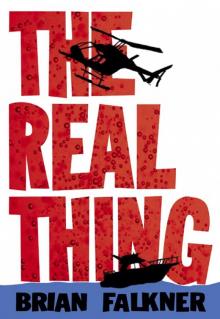 The Real Thing
The Real Thing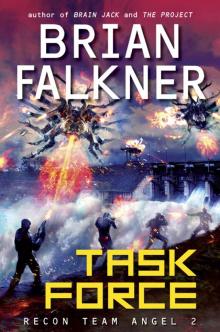 Task Force
Task Force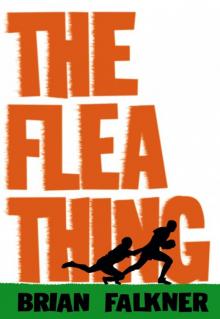 The Flea Thing
The Flea Thing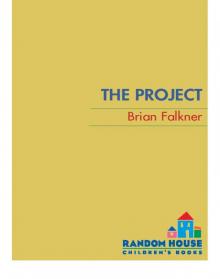 The Project
The Project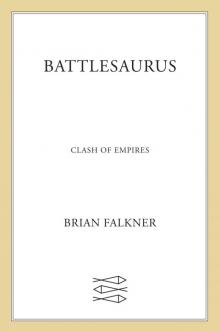 Clash of Empires
Clash of Empires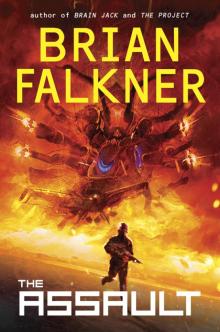 The Assault
The Assault Brain Jack
Brain Jack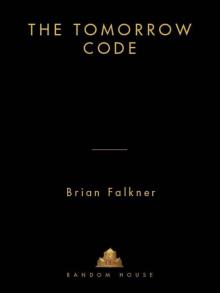 The Tomorrow Code
The Tomorrow Code Vengeance
Vengeance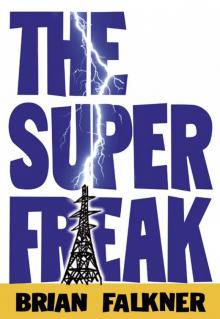 The Super Freak
The Super Freak Northwood
Northwood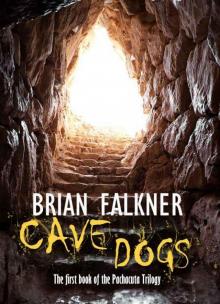 Cave Dogs (Pachacuta Book 1)
Cave Dogs (Pachacuta Book 1)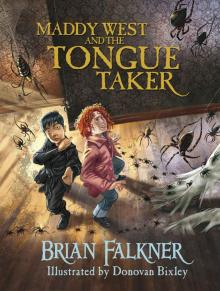 Maddy West and the Tongue Taker
Maddy West and the Tongue Taker